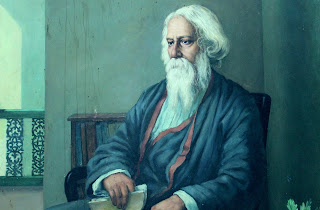India, a land of diverse cultures and rich heritage, has been home to many brilliant minds who have made significant contributions to the world. Among these luminaries are several extraordinary individuals who have been honored with the prestigious Nobel Prize, the highest recognition for their exceptional achievements in various fields. In this blog post, we will take a fascinating journey through the list of Nobel Prize winners from India, exploring their groundbreaking work and enduring legacies.
1. Rabindranath Tagore - Literature (1913):
The first Indian to ever receive the Nobel Prize was the
iconic poet, writer, and philosopher, Rabindranath Tagore. Awarded the Nobel
Prize in Literature for his collection of poems, "Gitanjali,"
Tagore's deeply emotive and spiritual verses touched the hearts of readers
worldwide. His works continue to inspire generations, making him an enduring
literary legend.
2. C.V. Raman - Physics (1930):
In 1930, Sir Chandrasekhara Venkata Raman, widely known
as C.V. Raman, brought India its first Nobel Prize in the field of Physics. He
discovered the scattering of light, a phenomenon later called the "Raman
Effect." This groundbreaking discovery revolutionized the understanding of
light and earned him a place among the greatest scientists of the 20th century.
3. Har Gobind Khorana - Physiology or Medicine (1968):
The brilliant biochemist, Har Gobind Khorana, shared the
Nobel Prize in Physiology or Medicine in 1968 for his pioneering research on
the genetic code and interpretation of the DNA. His work laid the foundation
for genetic engineering and opened new avenues for scientific advancements in
the medical field.
4. Mother Teresa - Peace (1979):
Known for her selfless devotion and humanitarian work,
Mother Teresa received the Nobel Peace Prize in 1979. Her unwavering commitment
to the care of the destitute and dying in Kolkata (Calcutta) touched the lives
of millions and inspired people globally to embrace compassion and kindness.
5. Subrahmanyan Chandrasekhar - Physics (1983):
A distinguished astrophysicist, Subrahmanyan
Chandrasekhar, was awarded the Nobel Prize in Physics for his groundbreaking
work on the structure and evolution of stars. His contributions to the
understanding of white dwarf stars and their ultimate fate have left an
indelible mark on astrophysics.
6. Amartya Sen - Economics (1998):
The eminent economist and philosopher, Amartya Sen, won
the Nobel Prize in Economics for his pioneering contributions to welfare
economics and the study of poverty. His theories on "capability
approach" have influenced public policies worldwide, aiming to enhance the
well-being of societies.
7. Venkatraman Ramakrishnan - Chemistry (2009):
Venkatraman Ramakrishnan, along with his colleagues, was
awarded the Nobel Prize in Chemistry for his research on the structure and
function of the ribosome. This breakthrough has profound implications for
understanding protein synthesis and has paved the way for the development of
new antibiotics.
8. Kailash Satyarthi - Peace (2014):
Kailash Satyarthi, an advocate for children's rights,
shared the Nobel Peace Prize in 2014 for his tireless efforts to eradicate
child labor and promote education for children. His courageous activism has
helped rescue thousands of children from exploitative labor practices.
9. Abhijit Banerjee - Economics (2019):
In 2019, Abhijit Banerjee, along with his wife Esther
Duflo and Michael Kremer, was awarded the Nobel Prize in Economics for their
experimental approach to alleviating global poverty. Their research, based on
randomized controlled trials, has provided valuable insights into effective
policies and interventions to address poverty-related challenges.
Conclusion:
The remarkable journey of Nobel Prize winners from India is a testament to the country's intellectual prowess and humanitarian spirit. From literature and physics to peace and economics, these laureates have shaped the course of history and inspired generations to dream big and contribute to the betterment of humanity. As we celebrate their achievements, let us be reminded of the potential within each of us to create a brighter and more compassionate world.
















0 Comments